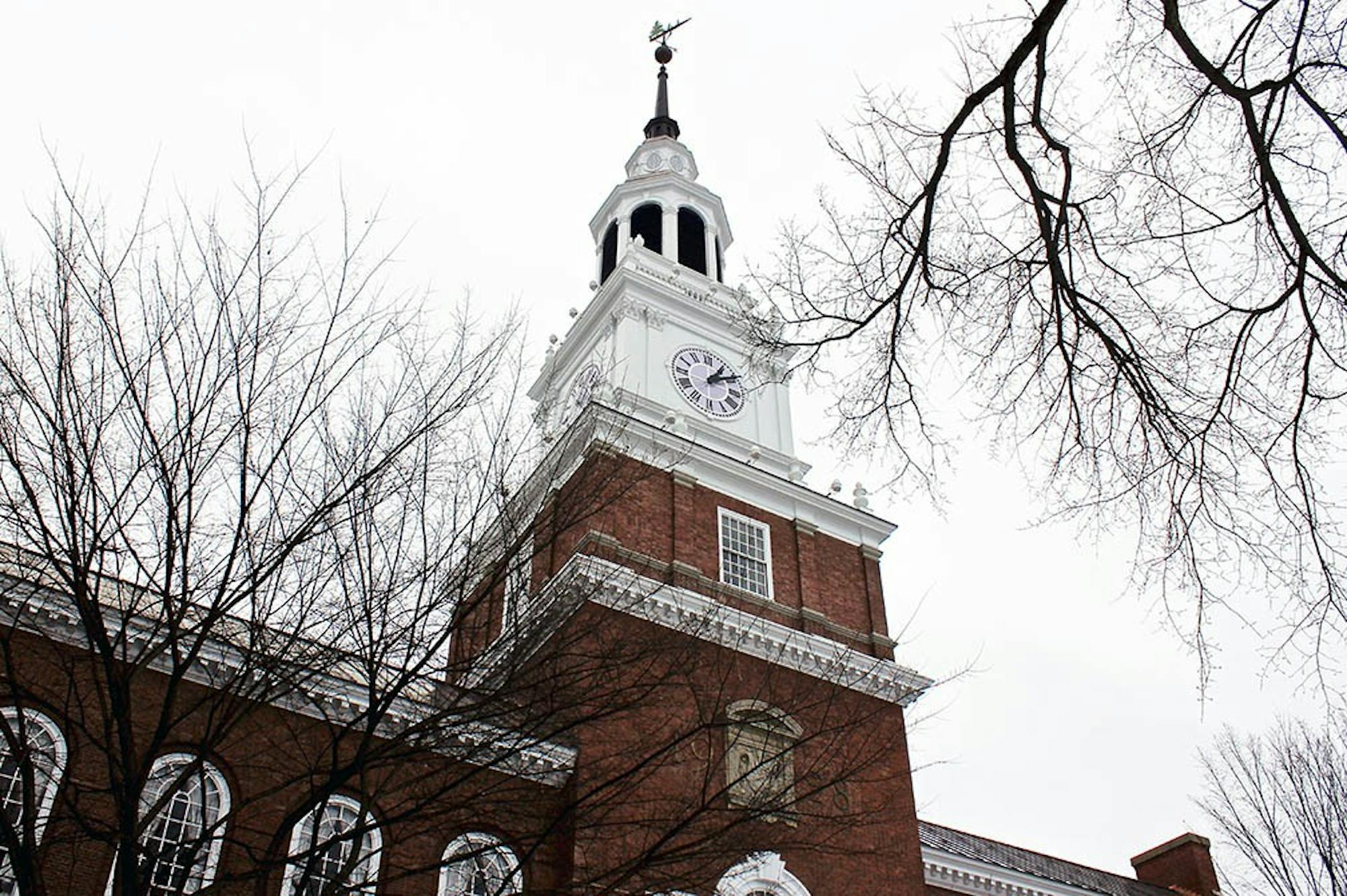This year, all five Dartmouth juniors who applied for the prestigious Barry Goldwater scholarship were accepted, the College announced on April 11.
According to the press release, the five juniors will join a cohort of 417 students selected from an applicant pool of over 5,000 college students across the country interested in research fields related to natural sciences, engineering and mathematics. After completing an internal application and interview at Dartmouth, Chance Bowman ’23, Amanda Calhoun ’23, Katherine Lasonde ’23, Nicholas Sugiarto ’23 and Maxwell Teszler ’23 submitted their applications to the national level.
According to the scholarship website, the program was formed in 1986 and honors the lifetime work of the late Sen. Barry Goldwater. The scholarship awards up to $7,500 per academic year to support student scientific research.
“I don’t think anyone really expects to win scholarships like this,” Lasonde said. “I’m really grateful and really lucky that I had all the help I did.”
Calhoun wrote in an emailed statement to The Dartmouth that she was “thrilled” and “in disbelief” to hear the news about the scholarship. Calhoun’s research involves investigating biomarker proxies which measure the carbon isotopes of lipids in some marine archaea — a type of bacteria — allow researchers to “reconstruct” the concentration of carbon dioxide in the atmosphere.
“I was first attracted to the field of geobiology by an introductory course taught by professor [Justin] Strauss,” she wrote. “In my work on stromatolites, I began to think about biofilm communities, past environments, fluid mechanics, sediment transport and ocean chemistry.”
According to the College’s announcement, Teszler’s research will work on fighting hunger “across the globe” and making edible plants more resilient and nutritious. Working alongside biology professor Mary Lou Guerinot, Teszler is researching how plants take in iron.
Bowman wrote in an emailed statement to The Dartmouth that his research investigates a protein found in Staphylococcus Aureus, a bacteria which causes the Methicillin-resistant Staphylococcus Aureus infection. He wrote that his goal is to determine the structure of the protein and figure out how to interfere with its function to decrease the bacteria’s ability to defend itself from the human immune system.
“The human immune system uses small peptides, called defensins, to attack bacteria. Staph. Aureus is able to sense and evade these defensins, and the protein that I am researching is involved in that response,” he wrote.
Bowman added that he is “surprised and elated” to be a Goldwater Scholarship recipient.
Sugiarto said that his research involves understanding the mutations in a series of proteins called SWI/SNF and their relationships to tumor formation and color cancer. While he said that SWI/SNF is mutated in 25% of all human cancers, its mechanisms are not yet fully understood.
Sugiarto said that it “never occurred” to him to apply until he read an email about the scholarship. According to Sugiarto, the “long and lengthy” process involved recommendation letters, a research essay and personal essays.
According to his research faculty advisor, Xiaofeng Wang, Sugiarto has been working in the lab for just under two years. Back in 2020, Wang said Sugiarto reached out to him via email, looking for research opportunities that could be conducted remotely. In the lab, Sugiarto handles computational components through coding and analyzes data generated from graduate student Luke Deary’s bench-based experiments.
Sugiarto said that he began researching on a “whim” his freshman summer, but since then, the process has become a “driving force” in his life.
Similarly, Lasonde said that she began her research journey her freshman year through the Women in Science Project. In the fall of 2019, Lasonde said she was matched to complete research with physics professor James Whitfield, in which she first learned about quantum computing. As Lasonde grew more interested in the hardware aspect of quantum computing, she switched over to working with engineering professor Eric Fossum, who specializes in image sensors.
Lasonde said that her research focuses on building a quantum computer that uses “nitrogen vacancy defects” in diamonds, which demonstrate a series of “cool properties.” She added that she works closely with magnets, microwaves and cameras to determine the “energy level,” magnetic and thermal properties of the defects.
In the future, Lasonde said that she hopes to get a master’s degree related to environmental science and eventually a Ph.D. According to Lasonde, quantum computers are well equipped to stimulate natural phenomena, making them useful in optimizing energy usage to combat climate change. She added that in the next five to 10 years, the industry is going to “explode.”
Lasonde reflected positively on her formative experiences with the Women in Science Project, Undergraduate Research and Advising and the Stamps Scholars program which she said led to her Goldwater scholarship.
“If I went to any other school, I probably would not be a Barry Goldwater scholar,” Lasonde said, noting Dartmouth’s “ample” research funding.
Maxwell Teszler is a member of The Dartmouth opinion staff.

Arizbeth Rojas ’25 is a managing editor of the 181st directorate from Dallas, TX. When she’s not listening to DJ Sabrina the Teenage DJ or planning her next half marathon, you can find her munching on a lox bagel.




